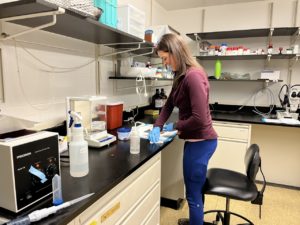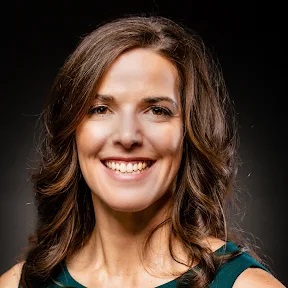Story by Grace Stetsko
 Bri Risk is a Ph.D. candidate in the Department of Food Science and Human Nutrition at Colorado State University.
Bri Risk is a Ph.D. candidate in the Department of Food Science and Human Nutrition at Colorado State University.
Tell us a little about your background
I was born in California, but raised in Arizona. My parents actually met in Loveland, Colorado, in high school and my mom shipped me off to my grandparents every summer. I owned my first food line when I was 15, selling baked goods at my parents company. I went to Culinary Institute of America in New York right after high school to earn an associate’s degree in bakery and pastry arts, however, I was more interested in the food science side. I decided to come to CSU for my undergrad and did a triple concentration major in food science, dietetics, and nutritional science. Upon graduation, I completed my dietetic internship through the Beaumont Health System in Detroit, Michigan. I currently have my own dietetic counseling practice, which is more of an integrative and functional approach to athlete training and eating behaviors as well as people who have autoimmune conditions. I also partnered with a sports dietitian in Denver before I came back to graduate school to create Birota Foods. We create more functional food products to give to athletes and the general population.
Tell us about your research
I am currently working in the labs of Drs. Tiffany Weir and Chris Gentile looking at microbiome and cardiovascular disease. We mainly focus on mouse research, looking at obesogenic mouse models and cardiovascular function with microbiome manipulations. In the manuscript I am drafting right now, we did notice that one probiotic improved endothelial function—the ability for the vessels to dilate and contract approximately. This might actually show some cardiovascular benefit because we also saw this in humans and now we are exploring the mechanisms. A shift in macronutrient regulation, intestinal permeability, and other inflammation markers have been observed.

What are your plans after you graduate?
This is a tricky question. Every good thing that has happened to me in my personal and professional life has fallen into my lap and anything I try to force ends up not working out. This is the path I have been on for 18 years and this is the last piece to pull it all together. I just have to believe I am on the right track and when I am done, hopefully the communications and connections will be there. I like to have my fingers dipped in multiple honeypots, so I could see myself teaching a little bit. However, I have always been more of an entrepreneur. I love to try new things, create new things for people to make them healthier.
What advice would you give to incoming Ph.D. students?
Just love what you do and have faith that you are on the right path. It is not always easy and clear, but remember why you are here—what do you want to get at the end and what will you be able to give to society? Go with the flow, it will be ok!
The Department of Food Science and Human Nutrition is part of CSU’s College of Health and Human Sciences.